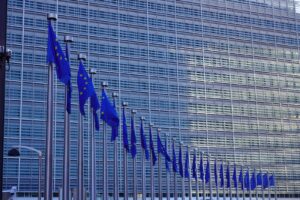If you ever needed proof that the European Commission is little more than a bloated, inert talking shop, look no further than its latest “initiative.”
Only now — three years after Russia’s tanks rolled into Ukraine, three years after promises to slash Kremlin funding — is Brussels considering a ban on new Russian energy contracts.
Not imposing it. Not enforcing it. Merely thinking about it.
This pathetic dithering is not just embarrassing — it is dangerous. It lays bare the moral and strategic vacuum at the heart of Europe’s political elite, and it gives the lie to all their grand speeches about “solidarity,” “sovereignty,” and “standing with Ukraine.”
Let’s be clear: by any reasonable measure, this decision is already years overdue. The moment Russian shells started falling on Ukrainian cities, the European Commission should have slammed the door on Moscow’s energy exports. Every litre of gas and every barrel of oil imported from Russia since then has helped fund a war machine that murders civilians, rapes towns, and abducts children.
Yet rather than acting decisively, the Commission has spent three years issuing sternly worded press releases and busying itself with summits, consultations, and impact assessments. Always a policy paper away from action. Always a focus group away from courage.
It is pitiful.
The reality is that Brussels’ endless prevarication has not been driven by ignorance. Everyone knew what was happening. Everyone knew Europe’s reliance on Russian energy was a strategic vulnerability. Experts, journalists, and even the Commission’s own internal assessments warned of it repeatedly. The political leadership simply didn’t have the guts to act.
Why? Because, as always in the EU, self-interest trumps principle. Germany, the self-styled moral compass of Europe, quietly maintained its LNG imports while preaching green virtue-signalling from the podium. Hungary signed sweetheart deals with Gazprom without even the decency to pretend otherwise. Italy dithered. France fiddled.
And the Commission, rather than confronting this hypocrisy, chose the path of least resistance. Better to keep the fragile facade of unity intact than to take bold, necessary action. Better to allow Russian energy to trickle into Europe — and money to trickle into Putin’s coffers — than risk upsetting a few cosy diplomatic cocktails.
Of course, we were told that caution was necessary to avoid market disruption. As if short-term economic discomfort were more dangerous than funding a genocidal regime. As if slightly higher energy bills were a greater threat than the collapse of Europe’s security order.
In truth, this was cowardice dressed up as prudence.
The irony is that Europe’s energy position today is far stronger than it was three years ago. New LNG terminals have come online. Supplies from Qatar, the US, and Norway have surged. Infrastructure projects that would have taken a decade under normal EU timetables were miraculously fast-tracked. The transition, while painful, has proven possible.
Which makes the current foot-dragging even more inexcusable.
The facts are brutally simple. Europe no longer needs Russian energy. Continuing to buy it is a choice — a choice that betrays Ukraine, undermines Europe’s own security, and emboldens every tinpot dictator who dreams of slicing up the free world.
And what message does this delay send to Putin? That Europe talks a good game but won’t back it up. That his bet on Western weakness was right. That he can outlast the moral outrage of comfortable bureaucrats sipping wine at Brussels conferences.
The tragedy is that Ukrainians have paid for the Commission’s cowardice in blood. While they fight in the mud and rubble for the basic right to exist, Europe’s unelected political class -EU Commissioners are appointed, not elected – cannot even summon the willpower to stop funding their enemy.
The contrast could not be starker. Ukraine fights for freedom with bullets and bayonets. Europe fights with memos and press releases.
It is tempting to say that if Brussels fails to act decisively now, it never will. But in truth, the time for action was three years ago. Every day since has been a betrayal — a betrayal not just of Ukraine, but of Europe’s own founding ideals.
If the European Commission still possesses even a shred of credibility, it will not merely “consider” a ban on new Russian energy contracts. It will implement it immediately, without loopholes, without exemptions, without another six months of mealy-mouthed consultation.
Enough delay. Enough excuses. Enough cowardice.
Europe’s security cannot be subcontracted to lawyers, consultants, and internal review panels. It must be defended — boldly, bravely, and with action, not words.
The Commission must act now. Not because it will be easy. Not because it will be painless. But because it is the only honourable thing left to do.
Anything less is not just weakness. It is complicity.
Main Image: Aurore BELOT © European Union 2016 – Source : EP Usage terms: Identification of origin mandatory
______________________________________________________________________________________________________________

Read Also: Rethinking Europe: Disestablishing the European Commission to Restore Sovereignty & Democracy.
Disestablishing the European Commission does not imply the abandonment of the European project. Rather, it offers an opportunity to revive it along more democratic, accountable, and pluralistic lines.
______________________________________________________________________________________________________________

